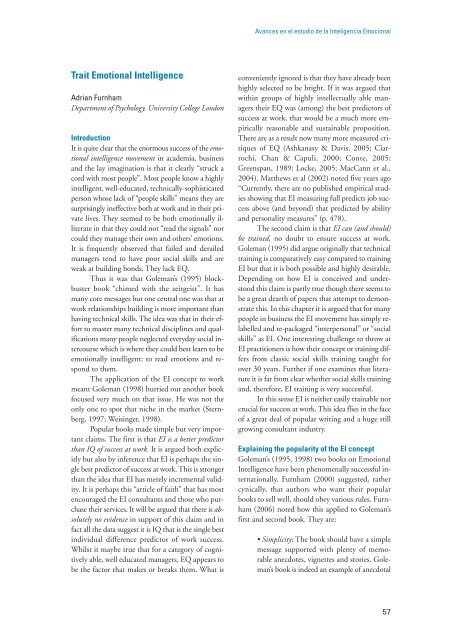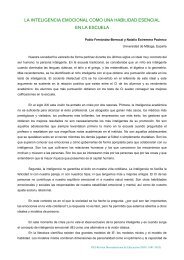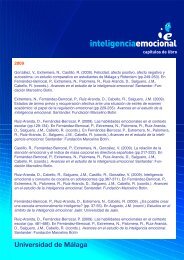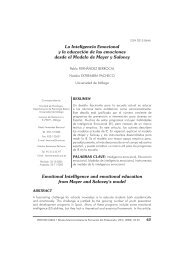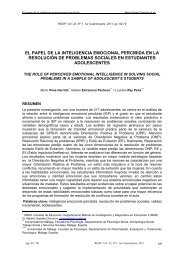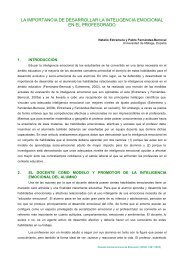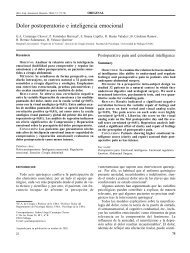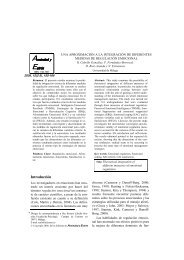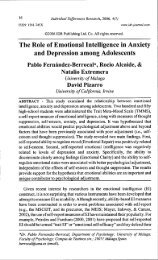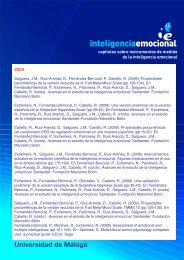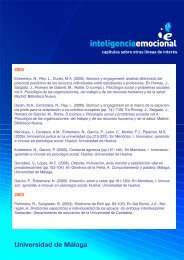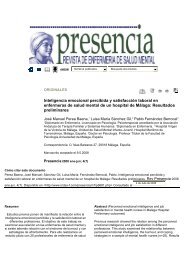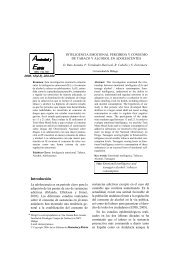Avances en el estudio de la Inteligencia Emocional
Avances en el estudio de la Inteligencia Emocional
Avances en el estudio de la Inteligencia Emocional
Create successful ePaper yourself
Turn your PDF publications into a flip-book with our unique Google optimized e-Paper software.
<strong>Avances</strong> <strong>en</strong> <strong>el</strong> <strong>estudio</strong> <strong>de</strong> <strong>la</strong> Int<strong>el</strong>ig<strong>en</strong>cia <strong>Emocional</strong><br />
Trait Emotional Int<strong>el</strong>lig<strong>en</strong>ce<br />
Adrian Furnham<br />
Departm<strong>en</strong>t of Psychology. University College London<br />
Introduction<br />
It is quite clear that the <strong>en</strong>ormous success of the emotional<br />
int<strong>el</strong>lig<strong>en</strong>ce movem<strong>en</strong>t in aca<strong>de</strong>mia, business<br />
and the <strong>la</strong>y imagination is that it clearly “struck a<br />
cord with most people”. Most people know a highly<br />
int<strong>el</strong>lig<strong>en</strong>t, w<strong>el</strong>l-educated, technically-sophisticated<br />
person whose <strong>la</strong>ck of “people skills” means they are<br />
surprisingly ineffective both at work and in their private<br />
lives. They seemed to be both emotionally illiterate<br />
in that they could not “read the signals” nor<br />
could they manage their own and others’ emotions.<br />
It is frequ<strong>en</strong>tly observed that failed and <strong>de</strong>railed<br />
managers t<strong>en</strong>d to have poor social skills and are<br />
weak at building bonds. They <strong>la</strong>ck EQ.<br />
Thus it was that Goleman’s (1995) blockbuster<br />
book “chimed with the zeitgeist”. It has<br />
many core messages but one c<strong>en</strong>tral one was that at<br />
work r<strong>el</strong>ationships building is more important than<br />
having technical skills. The i<strong>de</strong>a was that in their effort<br />
to master many technical disciplines and qualifications<br />
many people neglected everyday social intercourse<br />
which is where they could best learn to be<br />
emotionally int<strong>el</strong>lig<strong>en</strong>t: to read emotions and respond<br />
to them.<br />
The application of the EI concept to work<br />
meant Goleman (1998) hurried out another book<br />
focused very much on that issue. He was not the<br />
only one to spot that niche in the market (Sternberg,<br />
1997; Weisinger, 1998).<br />
Popu<strong>la</strong>r books ma<strong>de</strong> simple but very important<br />
c<strong>la</strong>ims. The first is that EI is a better predictor<br />
than IQ of success at work. It is argued both explicitly<br />
but also by infer<strong>en</strong>ce that EI is perhaps the single<br />
best predictor of success at work. This is stronger<br />
than the i<strong>de</strong>a that EI has mer<strong>el</strong>y increm<strong>en</strong>tal validity.<br />
It is perhaps this “article of faith” that has most<br />
<strong>en</strong>couraged the EI consultants and those who purchase<br />
their services. It will be argued that there is absolut<strong>el</strong>y<br />
no evid<strong>en</strong>ce in support of this c<strong>la</strong>im and in<br />
fact all the data suggest it is IQ that is the single best<br />
individual differ<strong>en</strong>ce predictor of work success.<br />
Whilst it maybe true that for a category of cognitiv<strong>el</strong>y<br />
able, w<strong>el</strong>l educated managers, EQ appears to<br />
be the factor that makes or breaks them. What is<br />
conv<strong>en</strong>i<strong>en</strong>tly ignored is that they have already be<strong>en</strong><br />
highly s<strong>el</strong>ected to be bright. If it was argued that<br />
within groups of highly int<strong>el</strong>lectually able managers<br />
their EQ was (among) the best predictors of<br />
success at work, that would be a much more empirically<br />
reasonable and sustainable proposition.<br />
There are as a result now many more measured critiques<br />
of EQ (Ashkanasy & Davis, 2005; Ciarrochi,<br />
Chan & Capuli, 2000; Conte, 2005;<br />
Gre<strong>en</strong>span, 1989; Locke, 2005; MacCann et al.,<br />
2004). Matthews et al (2002) noted five years ago<br />
“Curr<strong>en</strong>tly, there are no published empirical studies<br />
showing that EI measuring full predicts job success<br />
above (and beyond) that predicted by ability<br />
and personality measures” (p. 478).<br />
The second c<strong>la</strong>im is that EI can (and should)<br />
be trained, no doubt to <strong>en</strong>sure success at work.<br />
Goleman (1995) did argue originally that technical<br />
training is comparativ<strong>el</strong>y easy compared to training<br />
EI but that it is both possible and highly <strong>de</strong>sirable.<br />
Dep<strong>en</strong>ding on how EI is conceived and un<strong>de</strong>rstood<br />
this c<strong>la</strong>im is partly true though there seems to<br />
be a great <strong>de</strong>arth of papers that attempt to <strong>de</strong>monstrate<br />
this. In this chapter it is argued that for many<br />
people in business the EI movem<strong>en</strong>t has simply r<strong>el</strong>ab<strong>el</strong>led<br />
and re-packaged “interpersonal” or “social<br />
skills” as EI. One interesting chall<strong>en</strong>ge to throw at<br />
EI practitioners is how their concept or training differs<br />
from c<strong>la</strong>ssic social skills training taught for<br />
over 30 years. Further if one examines that literature<br />
it is far from clear whether social skills training<br />
and, therefore, EI training is very successful.<br />
In this s<strong>en</strong>se EI is neither easily trainable nor<br />
crucial for success at work. This i<strong>de</strong>a flies in the face<br />
of a great <strong>de</strong>al of popu<strong>la</strong>r writing and a huge still<br />
growing consultant industry.<br />
Exp<strong>la</strong>ining the popu<strong>la</strong>rity of the EI concept<br />
Goleman’s (1995, 1998) two books on Emotional<br />
Int<strong>el</strong>lig<strong>en</strong>ce have be<strong>en</strong> ph<strong>en</strong>om<strong>en</strong>ally successful internationally.<br />
Furnham (2000) suggested, rather<br />
cynically, that authors who want their popu<strong>la</strong>r<br />
books to s<strong>el</strong>l w<strong>el</strong>l, should obey various rules. Furnham<br />
(2006) noted how this applied to Goleman’s<br />
first and second book. They are:<br />
• Simplicity: The book should have a simple<br />
message supported with pl<strong>en</strong>ty of memorable<br />
anecdotes, vignettes and stories. Goleman’s<br />
book is in<strong>de</strong>ed an example of anecdotal<br />
57


